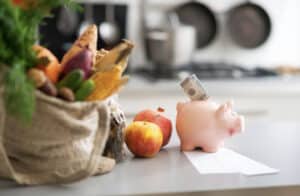1. Find out when your local Supermarket marks down their produce
Ask your local supermarket which day of the week, and time of day that they mark down the bulk of their fresh produce. This is great for stocking up on meats and fish that you can pop in to the freezer, or picking up reduced veggies that can be made into soups and casseroles that can then be frozen.
2. Use an App to Find Supermarket Deals
Brands rotate their best deals around different supermarkets. You can download trolley.co.uk onto your phone as an app or use it in your browser when planning your shopping for the week ahead.
Here’s a link to the App: https://apps.apple.com/gb/app/trolley-co-uk/id1573111597
3. Buy in Bulk
Oats, Rice, Nuts and Seeds are cheaper when you buy in bulk. Shop around for the best deals, LIDL and Aldi tend to be the cheapest for store cupboard basics such as these. Buy bigger bags that last longer. A large 25kg sack of potatoes is roughly £10, and should last 2 months, compare that to a smaller 1.25kg bag at £1.10 and thats a saving of £21.25!
4. Batch Cook
Choose 2-3 recipes that you can batch cook and portion up to keep in the fridge/freezer. Not only will this save you time, but it will keep you on track throughout the week and save on ingredients.
Think soups, casseroles, stews, chillis, tomato based sauces, bolognese, ratatouille.
5. Get the Slow Cooker Out
This will help with batch cooking, but also saves on the energy bill! Having the slow cooker on for 6 hours is a fraction of the cost of using the oven for an hour. And it’s a mega-convenient time saver. Also ideal for those that aren’t confident in the kitchen as you just throw it all in and let it do the work.
Download our Slow Cooker Recipe Book
6. Dust off the Air-fryer
Or have a look online to see if you can find a deal to get an Air-fryer. These save on time, energy, but also, you don’t need to use any oil or fats when cooking. Pretty much anything can go in the Air Fryer, it’s great for meats, veggies, potatoes.
7. Grow Your Own Micro Greens
You don’t need to buy big bags of spinach and broccoli to get the nutrients that you need. Sprouting and growing micro greens is not only fun to do, but they give you at least 10 times the amount of super-nutrients than the fully grown versions of greens. You can grow these easily on your window sill.
Check out this link to learn how to sprout broccoli seeds
8. Grow Your Own Veggies
Tomatoes, Green Beans, spinach, rocket and herbs are all cheap and easy projects and can yield large crops that will see you through the summer. Pick up a grow bag, plant some seeds or starter plants, and away you go! Protect them from bugs and talk to them daily. Got too many tomatoes? Batch cook a tomato and garlic sauce and keep it in the freezer.
9. Boil Your Bones!
Get the most from your Sunday roast chicken and pop it in the slow cooker with some carrots, onions, water and herbs. After 6-8 hours you’ll have a lovely soothing bone broth that’s great for gut healing and can be frozen in ice cube trays as stock cubes. You can use any bones, but beef and chicken work best.
Download our Gut Healing Bone Broth Recipe Here
10. Consider Buying Own Brands
Big brand names are priced higher, and in most cases you are just paying for the brand and the packaging. Try out some of the stores ‘own brands’ – we think you’ll be surprised! The difference in price is worth it.
11. Don’t waste money on ‘Organic’
You don’t need to buy organic versions of everything. Have you heard of the Clean 15 and the Dirty Dozen? These lists are updated annually and will tell you which foods don’t need to be purchased organic because they are classed as ‘clean’ in terms of pesticide and fungicide use.
Click here to view the Clean Fifteen and Dirty Dozen
12. Use Leftovers
Leftover veggies and meats can be used in soups, salads, stir-fries, stews. Remember bubble and squeak? Leftover white potato, sweet potato, celeriac or even butternut squash.. mash it up with leftover greens and onions, throw it around the frying pan and serve it up with poached egg on top.
13. Plan In Advance
Decide as a family what the menu is for the week ahead. This will not only help you stay on track and keep you away from the takeaways, but it will save on ingredients when you can see how you can use leftovers.
14. Do Your Food Shop Online
You’ll be less likely to throw items you don’t need in to your shopping cart. Can’t shop online? Plan ahead, write a list and stick to it. Don’t forget to connect your rewards card to claim your loyalty points and ask to be notified of any special offers.
15. Buy Frozen Veggies and Fruits
From a nutrient perspective, these are actually better than buying fresh! Because they are picked and frozen at the source they retain more nutrients than fresh produce that has been picked prematurely and flown to us on a plane. And much much cheaper too.
Check out the price comparison app above for the best frozen bags. We’ve found that Aldi frozen raspberries are 50 pence cheaper than Sainsbury’s and you get 50g more!
Frozen spinach, chopped onions, peppers and peeled butternut squash are very convenient for meal prepping and batch cooking.
16. Eat Seasonally
If you prefer to buy your fruits and veg fresh each week, buy those that are ‘in season’. Asparagus is twice the price in Autumn/Winter because it’s in season in Spring.. and therefore cheaper. Below is an image of the seasonal wheel from LEON Restaurant that shows what to buy, at which time of year. You can even buy a Seasonal Wheel chopping board from Aldi!

17. Cut Down on Your Wastage
Freeze your fruits and veggies that are on the turn, for example banana, celery, spinach, mushrooms, fresh herbs.
Use the sniff test on your foods, don’t just go by the ‘use by’ date on the packet.
Use peelings and vegetable ends as compost for your tomatoes that you’re cultivating in the back garden! Finally, reorganise your fridge into date order and keep the foods you need to use up at the front so they don’t get missed and wasted.
18. Cut Out Processed Foods
These carry a higher price tag for the convenience and are packed with additives and sugars that leave you feeling hungry shortly after. Use the money you save to buy whole foods which will keep you fuller for longer and give you more bang for your buck.
19. Track Your Calories and Your Protein Intake
We live in a world where we consume more than we need, but you can eat less and feel fuller just by increasing your protein intake. Protein keeps you fuller for longer, which leads to less snacking, which cuts down on what you consume and buy and you’ll feel healthier too! Use an app such as MyFitnessPal and aim for 35-40% protein intake each day.
20. Pack Your Own Lunch
All those sandwiches and jacket potatoes from the local lunch van add up! Use the leftovers from last nights dinner, or get a good wide neck flask and take soup, chilli or stew to work. Pack some nuts in there as a snack to get you through the afternoon ready for your slow cooker dinner.
21. Cut Back on The Gourmet Coffees
Have you ever added up what you spend in a week on Costa and Starbucks coffees? You’ll be surprised! Switching over to fresh lemon in hot water is much cheaper and your liver will love you for it! Not ready to give up your coffee fix? Make your own hot drink in a travel mug and take it with you.


